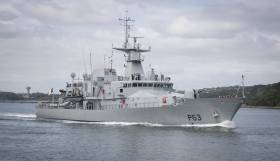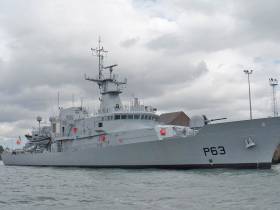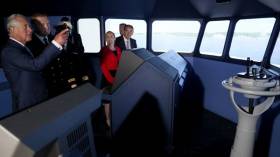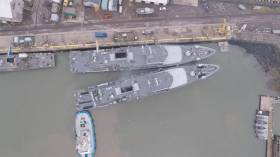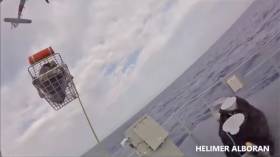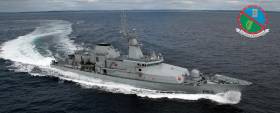Displaying items by tag: LE William Butler Yeats
A Naval Service offshore patrol vessel (OPV) which was on a six-week deployment in the Mediterranean Sea to enforce a UN embargo on arms shipments to Libya has returned to Cork Harbour.
The deployment of L.É. William Butler Yeats in June was the first Naval Service ship to have taken place since 2018.
This latest overseas mission as part of EUNAVFOR MED Operation Irini was also to impose an embargo on the export of oil from the north African nation.
The offshore patrol vessel (OPV) was captained by Lieutenant Commander Alan Flynn and a crew of 57 which arrived yesterday to the Naval Base on Haulbowline.
The OPV was tasked with Information, Surveillance and Reconnaissance (ISR) operations as well as Rigid Hull Inflatable Boat (RHIB) Operations during the deployment. This is where the RHIB's assisted in the inspection of vessels off the Libyan coast and conducted secondary tasks such as the disruption of human smuggling and trafficking networks.
Several crew members were involved in previous deployments, including Operations Pontus and Sophia, however for the majority of the crew this was their first overseas deployment.
Awaiting at the Naval Base, families of the crew were greeted and welcomed home. On the occasion also at the base, the crew following their service abroad received Irish peacekeeping medals.
Naval Service crew of the P60 class LÉ William Butler Yeats are making final preparations at the Naval base headquarters in Cork Harbour ahead of the departure to the Mediterranean Sea.
The offshore patrol vessel (OPV) reports RTE News is to be deployed for six-weeks off north Africa as part of an EU operation to enforce the United Nations' arms embargo on Libya.
A crew consisting of 53 men and five women, most of them making their first deployment overseas, are to serve this new role for the LÉ William Butler Yeats which is to operate alongside other EU member state navies and aircraft.
This will be formed by the EU NavforMed fleet that is tasked with ‘Operation Irini’ which is to enforce an arms embargo, but also in training the Libyan Coast Guard. Such involvement between Irish Naval personnel and the LCG drew concerns from the opposition in a Dáíl vote last April, for more see related story on human rights.
Asides routine Maritime Security and Defence patrolling of the Irish coast, Afloat highlights that the LÉ William Butler Yeats has been deployed before by the Defence Forces to the Mediterranean in 2017.
This three-month mission saw humanitarian operations carried out and in the rescuing of migrants using unseaworthy craft controlled by people-smuggling gangs.
During the deployment the crew of the OPV had rescued 704 persons and recovered the bodies of 3 deceased.
RTE News continues here on this latest deployment development.
A Government decision to deploy a Naval Service patrol ship for maritime security in the Mediterranean has been welcomed by the Defence Forces.
As Afloat reported earlier, The LÉ William Butler Yeats has been identified as the vessel which will participate in the EU Naval Force in the Mediterranean (EUNAVFOR MED) operation “ Irini” in June and July 2023.
This is subject to Dáil approval; the Defence Forces press office notes.
“Irini” is the Greek word for peace, and the operation was initiated as part of EUNAVFOR MED in March 2020.
It is tasked with implementation of the UN arms embargo on Libya through the use of aerial, satellite and maritime assets.
The EU mission is mandated to carry out inspections of vessels on the high seas off the coast of Libya which are suspected to be carrying arms or related material to and from Libya in accordance with UN Security Council resolution 2292 (2016) and subsequent UN resolutions, in addition to monitoring violations perpetrated via aerial and land routes.
As secondary tasks, “Op Irini” also: monitors and gathers information on illicit exports from Libya of petroleum, crude oil and refined petroleum products;
contributes to the disruption of the business model of human smuggling and trafficking networks through information gathering and patrolling by planes;
is tasked to support capacity building and training of the Libyan Coast Guard and Navy. The implementation in this activity has not started due to the political fragmentation in Libya, the EU mission says.
The crew of LÉ William Butler Yeats will begin a “work up period” to be “mission ready”, the Defence Forces press office says.
The ship will be tasked with information, surveillance and reconnaissance operations while also engaging in rigid hull inflatable boat operations on a regular basis, a capability in which the Navy “excels, from experience in the north-east Atlantic ocean”, the press office said.
Defence Forces chief of staff Lieut Gen Seán Clancy welcomed the announcement stating that the deployment of LÉ William Butler Yeats on “Op Irini” will “provide the operation with highly skilled and capable personnel with experience in Maritime Defence and Security Operations (MDSO) throughout Ireland’s maritime domain and on previous overseas missions – Operation Pontus and Sophia”.
“This deployment is crucial to the regeneration of Ireland’s Navy and is directly linked to our efforts to recruit, retain and incentivise seagoing,” he said.
 Flag Officer Commanding Naval Service, Commodore Michael Malone
Flag Officer Commanding Naval Service, Commodore Michael Malone
Flag Officer Commanding Naval Service, Commodore Michael Malone said that “with ambitions for the expansion of the Naval Service, as outlined in the Commission on the Defence Forces report, this deployment presents an opportunity to build on the experiences gained through previous maritime overseas missions”.
“Our sailors bring vital experience to bear in what remains a dynamic operational role,” he said
The Journal reports that the Defence Forces have confirmed the deployment of a Naval Service vessel to the Mediterranean off North Africa to join an operation targeting arms smugglers in Libya.
As previously reported on Afloat.ie, the deployment as part of Operation Irini is expected to begin in June for a number of weeks. It will mark the first overseas deployment for the Naval Service since the humanitarian mission Operation Sophia in the Mediterranean in 2018 and 2019.
It’s reported that the crew of the LÉ William Butler Yeats will commence training for the operation immediately. The Journal has more on the story HERE.
City of Galway to Be Twinned With Newest Irish Naval Service Ship
#GalwayHarbour - The mid-west city of Galway is to be twinned with the Irish Naval Service newest ship, LÉ William Butler Yeats, at a reception this weekend to mark and honour the relationship between the city and vessel.
As the Galway Advertiser writes, the ceremony, hosted by Galway City Council, will take place this Saturday, September 15.
It will be attended by Fine Gael Galway West TD and Minister of State for Natural Resources and Digital Development Seán Kyne, who will represent the Minister with responsibility for Defence, Paul Kehoe.
For more on the twinning of the newest OPV P60 class vessel in service, click here.
‘Shark Fin’ Boat Detained By Naval Service
The Irish Times reports that the Naval Service has detained a Spanish fishing vessel that had more than 5,000 shark fins.
Last week, the Virxen da Blanca, one of a fleet longline fishing for shark of the South West, was escorted to Castletownbere after it was boarded by a team from the LÉ William Butler Yeats, who found more than a tonne of shark fins on board.
The EU banned the removal of shark fins at sea in 2013. However, it’s being reported in the Spanish press that the boat's operators claim Irish authorities have misinterpreted the regulations over which fins may or may not be removed.
The Irish Times has more on the story HERE.
#NavyNews - On visit to Cork Harbour writes the Irish Examiner, the Prince of Wales discovered that piloting a ship is like riding a bike – you never lose the knack.
More than 40 years after he commanded a British warship during his Royal Navy days he returned to the bridge – albeit a simulator with a very realistic 180-degree projection of the sea.
Charles, who captained the mine hunter HMS Bronington for 10 months in 1976, joined naval students at the National Maritime College of Ireland (NMCI) near Cork for the trip down memory lane.
At first, Lieutenant Gavin McCarthy, a navigation instructor, called out the manoeuvres for the ship WB Yeats which Charles repeated for those training for a career on the seas.
WB Yeats – a mock-up of a real off-shore patrol vessel – was in waters off the town of Cobh, famous for being the last port of call for the Titanic before it set off on its ill-fated journey.
Charles marvelled at the scene in front of him which gave a real-time feel to the movement of the ship, especially when stormy waters were introduced with the click of a mouse and he said “it’s extraordinary” as the projection outside the windows appeared to make the ship move up and down over the waves.
For further reading of the historic visit to the naval base, click here.
#Navy - The Naval Service has posted to its Facebook page a remarkable video captured by drone of the LÉ William Butler Yeats carefully berthing in its home port at Haulbowline in Cork Harbour.
The €66 million vessel, which was formally commissioned into service in October 2016, can be seen being slowly but surely positioned by a small but powerful tug alongside a sister ship — the two Naval Service vessels almost kissing at the bow.
LÉ William Butler Yeats is the third of three newly commissioned navy ships, after leadship LÉ Samuel Beckett and LÉ James Joyce, constructed by Babcock Marine Appledore in Devon, UK.
The ship spent much of 2017 on humanitarian patrol in the Mediterranean, where the Government has pledged to send two Naval Service ships this year as part of the EU’s mission to rescue migrants and reduce people-smuggling.
#Navy - A Naval Service seaman has expressed his gratitude to the Spanish coastguard for saving his life, after he fell ill while on humanitarian duty in the Mediterranean.
According to the Irish Examiner, Craig Clear was airlifted to Almeira from the deck of the LÉ William Butler Yeats on Tuesday (18 July) after suffering a collapsed lung and severed arteries.
But after two successful surgeries, the Co Laois man is in recovery — and on Wednesday he took to social media to share his gratitude to the helicopter rescue team from the Salvamento Maritimo.
The LÉ William Butler Yeats arrived in the Mediterranean on Monday (17 July) to take over from the returning LÉ Eithne, which is due in Cork Harbour today, as previously reported on Afloat.ie.
LÉ William Butler Yeats Formally Commissioned Into Naval Service
#OPV90named - A new Irish Naval Service vessel costing in the region of €66m has been formally commissioned at a ceremony in Galway Port, reports RTE News.
After an address by the Taoiseach at Galway Harbour yesterday, the LÉ William Butler Yeats (P63) was officially named by a granddaughter of the poet, Caitriona Yeats.
The formal commissioning followed, before Lieutenant Commander Eric Timon led the crew aboard.
The LÉ William Butler Yeats replaces the LÉ Aisling in the naval fleet, after the latter was decommissioned last May.
Afloat adds that the third OPV90 class newbuild built by Babcock Marine, Appledore in the UK had paid a visit to Dun Laoghaire Harbour in late September.
She follows leadship LÉ Samuel Beckett and LÉ James Joyce, also completed by the north Devon shipyard. In recent weeks this pair switched deployment duties in providing humanitarian operations in the Mediterranean Sea.



























